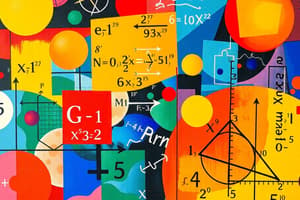Podcast
Questions and Answers
गणित का कौन सा शाखा संख्याओं और प्रतीकों के संचालन से संबंधित है?
गणित का कौन सा शाखा संख्याओं और प्रतीकों के संचालन से संबंधित है?
- संख्या सिद्धांत
- बीजगणित (correct)
- ज्यामिति
- कैलकुलस
एक समीकरण में अज्ञात मानों को किस प्रतीक से दर्शाया जाता है?
एक समीकरण में अज्ञात मानों को किस प्रतीक से दर्शाया जाता है?
- घातांक
- चर (correct)
- गुणांक
- स्थिरांक
समीकरण हल करने का क्या अर्थ है?
समीकरण हल करने का क्या अर्थ है?
- समीकरण को रद्द करना
- समीकरण को जटिल बनाना
- समीकरण को सरल करना
- चरों के मान ज्ञात करना जिससे समीकरण सत्य हो (correct)
बीजगणित के उन्नत विषयों में निम्न में से कौन शामिल है?
बीजगणित के उन्नत विषयों में निम्न में से कौन शामिल है?
$2x + 3y = 10$ एक उदाहरण है:
$2x + 3y = 10$ एक उदाहरण है:
निम्न में से कौन सा गणित का एक शाखा नहीं है?
निम्न में से कौन सा गणित का एक शाखा नहीं है?
इनमें से कौन सी गणित की शाखा बिंदुओं, रेखाओं, कोणों, सतहों और ठोस के स्थानिक गुणों और संबंधों पर ध्यान केंद्रित करती है?
इनमें से कौन सी गणित की शाखा बिंदुओं, रेखाओं, कोणों, सतहों और ठोस के स्थानिक गुणों और संबंधों पर ध्यान केंद्रित करती है?
निम्नलिखित में से कौन सा विषय त्रिकोणमिति से संबंधित है?
निम्नलिखित में से कौन सा विषय त्रिकोणमिति से संबंधित है?
निम्नलिखित में से कौन सी अवधारणा अंकगणित की बुनियादी अवधारणाओं में से एक है?
निम्नलिखित में से कौन सी अवधारणा अंकगणित की बुनियादी अवधारणाओं में से एक है?
निम्नलिखित में से कौन सी अवधारणा गणित की बुनियादी अवधारणाओं में से एक नहीं है?
निम्नलिखित में से कौन सी अवधारणा गणित की बुनियादी अवधारणाओं में से एक नहीं है?
निम्नलिखित में से कौन सा विषय गतिशील रूप से बदलते ठोसों और आकृतियों का अध्ययन करता है?
निम्नलिखित में से कौन सा विषय गतिशील रूप से बदलते ठोसों और आकृतियों का अध्ययन करता है?
निम्नलिखित में से कौन सा विषय निर्देशांक प्रणाली का उपयोग करके ज्यामितीय समस्याओं को हल करता है?
निम्नलिखित में से कौन सा विषय निर्देशांक प्रणाली का उपयोग करके ज्यामितीय समस्याओं को हल करता है?
Flashcards are hidden until you start studying
Study Notes
Math
Math is a subject that deals with numbers, quantities, structure, space, and change. It involves analyzing patterns and relationships among quantities and objects, and developing methods for solving problems using these patterns. The field can be divided into several branches, each focusing on specific aspects of mathematics. Some common branches include algebra, geometry, arithmetic, calculus, statistics, and number theory. Each branch consists of various subtopics that build upon basic concepts and principles.
Algebra
Algebra is the branch of math that deals with symbols and their manipulation using rules called algebraic operations. It involves solving equations to determine values of variables, analyzing structures, and creating models to represent relationships among abstract concepts.
Basic Concepts
The most fundamental concept in algebra is the equation, which relates unknown quantities to known values through symbols representing mathematical operations. Variables are used to represent these unknown quantities, while constants are fixed numbers that do not change. Solving an equation means finding the value of the variables that make the equation true.
Advanced Topics
More advanced topics in algebra include systems of linear equations, quadratic equations, polynomial functions, and matrix algebra. These topics involve complex problem-solving techniques, such as elimination methods, substitution methods, and graphing techniques, to solve more complex problems.
Geometry
Geometry is the branch of math that focuses on spatial properties and relationships between points, lines, angles, surfaces, and solids. It involves understanding shapes and their properties, and analyzing spatial arrangements.
Basic Concepts
Some basic geometric concepts include point, line segment, ray, angle, triangle, circle, polygon, and parallelogram. Understanding these concepts helps build a foundation for further studies in geometry.
Advanced Topics
Advanced topics in geometry include trigonometry, analytic geometry, conic sections, and transformations. Trigonometry deals with ratios of sides and angles of triangles, providing ways to calculate distances and lengths. Analytic geometry applies coordinate systems to solve geometric problems. Conic sections focus on circles, ellipses, hyperbolas, and parabolas. Transformations study how objects change when they are moved, rotated, or reflected.
Arithmetic
Arithmetic is the branch of math dealing with basic operations involving numbers. It includes addition, subtraction, multiplication, division, and fractions.
Basic Concepts
Basic arithmetic concepts include counting numbers, whole numbers, integers, decimals, and fractions. Counting numbers start with zero and continue indefinitely, while whole numbers include only positive natural numbers. Integers include negative and positive numbers, as well as zero. Decimal numbers use fractions to express parts of a whole, often applying place value principles. Fractions are ratios of two quantities, typically one part out of another.
Advanced Topics
Advanced topics in arithmetic include prime numbers, percentages, and algebraic equations. Prime numbers are integers greater than one that have no divisors except 1 and themselves. Percentages represent parts of a whole as a percentage of the whole. Algebraic equations allow us to solve problems by using letters to represent unknowns.
Calculus
Calculus is the branch of math that deals with rates of change and slopes of curves, and provides tools to analyze and model continuous phenomena.
Basic Concepts
Basic calculus concepts include limits, derivatives, integrals, and infinite series. Limits help determine the behavior of a function near a certain point, while derivatives provide information about the rate at which a function changes over time. Integrals measure the area under a curve. Infinite series involve adding up infinitely many terms to calculate sums of numbers.
Advanced Topics
Advanced topics in calculus include differential equations, multivariable calculus, and topology. Differential equations describe the relationship between a function and its derivative, allowing us to predict future states based on current conditions. Multivariable calculus extends single variable calculus to functions of multiple variables. Topology studies the properties of shapes that are preserved under continuous transformations.
Statistics
Statistics is the branch of math that deals with data collection, organization, analysis, and interpretation. It involves making inferences from data to gain insights into the behavior of populations or phenomena.
Basic Concepts
Basic concepts in statistics include measures of central tendency, measures of dispersion, and probability distributions. Measures of central tendency help summarize data by indicating the most common or typical value. Measures of dispersion describe the spread of data around the central tendency. Probability distributions describe the likelihood of different outcomes in a random event.
Advanced Topics
Advanced topics in statistics include hypothesis testing, regression analysis, time series analysis, and machine learning. Hypothesis testing involves using data to accept or reject a proposed statement about a population characteristics. Regression analysis builds models to understand the relationship between independent and dependent variables. Time series analysis examines trends and patterns in data collected over time. Machine learning uses algorithms to learn patterns from data without explicit programming.
Number Theory
Number theory is the branch of math that deals with properties of numbers, particularly integers. It aims to understand the inherent structure of numbers and develop efficient algorithms for computational tasks.
Basic Concepts
Basic concepts in number theory include divisibility, prime numbers, and greatest common factors. Divisibility determines whether one integer is divisible by another without remainder. Prime numbers are those with no proper divisors other than 1 and themselves. Greatest common factors identify the largest number that both given numbers divide evenly.
Advanced Topics
Advanced topics in number theory include Diophantine equations, Fermat's theorem, and cryptography. Diophantine equations involve finding integer solutions to equations instead of real-number solutions. Fermat's theorem discusses the existence of large prime numbers. Cryptography uses complex mathematical problems to secure communication channels, such as encryption and digital signatures.
Studying That Suits You
Use AI to generate personalized quizzes and flashcards to suit your learning preferences.




